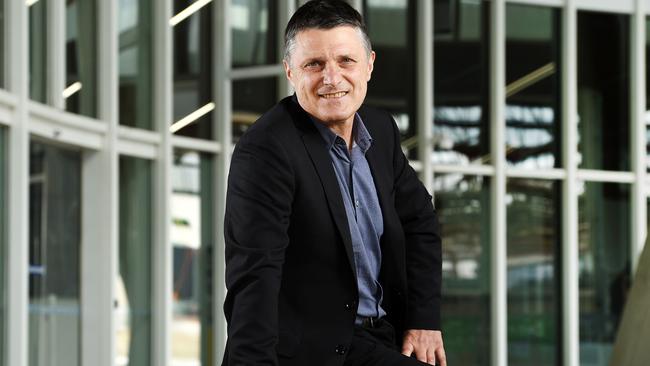Ensuring subs built in SA was needed to avoid economic disaster in state
WORK must be done to ensure as many jobs as possible are created locally from the decision to build Australia’s next submarines in South Australia, experts say.

SA News
Don't miss out on the headlines from SA News. Followed categories will be added to My News.
- $50bn Future Submarines to be built in Adelaide by French firm DCNS
- Weatherill says decision to build 12 submarines in Adelaide will kickstart jobs ‘immediately’
- Japan asks for explanation on submarine contract going to France’s DCNS
- How the French Barracuda differs from the Collins class sub
THE decision to build Australia’s Future submarines in South Australia was a “circuit breaker’’ needed to avoid an economic disaster for the state, but work must be done to ensure as many jobs as possible are created locally, experts say.
The $50 billion contract will also do little to avoid a looming jobs crunch as Holden closes next year, the Alinta power station at Port Augusta closes next month and the future of Arrium’s Whyalla operations hangs in the balance.
The winning French bidder, DCNS, has previously pledged to create 2900 hi-tech and manufacturing jobs — 1700 of them at Osborne shipbuilder ASC. These would include naval architects, marine engineers, electricians and painters. A further 600 supply chain jobs would be created, including mechanical and electrical engineers, along with 500 in combat system integration.
Serious job creation locally will not start for some years however, with the local build not expected to start until the mid-2020s.
The construction of at least one offshore patrol vessel in SA starting in 2018, followed by the Future Frigates from 2020, is expected to plug the gap until then, with the aim that ASC’s current workforce of 2000 is not seriously depleted in the meantime.
John Spoehr, director of the Australian Industrial Transformation Institute at Flinders University, said the subs decision was “one of the building blocks needed to accelerate transformation of South Australia’s ailing manufacturing industry’’.
“A circuit breaker like the submarine project was urgently needed to instil some hope in a State where despair was on the rise,’’ Mr Spoehr said
“On its own it won’t solve the short term problem of job losses in the automotive industry but it can lay the foundations for the growth of a robust advanced manufacturing sector in South Australia.
“Projects of this scale and complexity help to underpin more rapid uptake and diffusion of advanced technologies and workplace innovation. This is essential to the successful roll out of a project like this and it is enormously beneficial for other industry sectors that can grow more rapidly on the back of this long term investment.’’
Mr Spoehr said, with the first submarine to be built in France, it will “require a sophisticated knowledge and skills transfer program to ensure that (the) opportunity is maximised’’.
Defence Teaming Centre chief executive Chris Burns said the workforce for all of the defence projects would now need to be developed.
“It will be tight, but we can do it,’’ he said.
“And there’ll be a substantial infrastructure investment down there (at ASC), so if you’re in the construction business you’re also going to reap the benefits of this.”
Mr Burns said it was possible there would still be job losses between now and when work ramped up at ASC, however he hoped they would be minimal.
“I think there will be a small loss of jobs in between but hopefully now that we know, we can start planning and absolutely minimise that,” he said.
“At last we now have certainty about what will be built and where and when into the future.”
Business SA executive director, industry & government engagement, Anthony Penney, said the contract was a “timely boost” to the state economy, but said it was vital that small to medium sized businesses were involved.
“SMEs are important players in the supply chain for major contracts and Business SA is keen to see that businesses of all sizes have the opportunity to play their part in this contract,’’ he said.
“Business SA was a strong proponent of the Office of the Industry Advocate that has opened up opportunities for SMEs to participate in major State Government contracts and we look to the Federal Government to support SMEs in a similar way in relation to the submarine contract.’’
Baillieu Holst chief economist Darryl Gobbett said the state needed to make sure a broad industry was built around this opportunity.
“We need to ensure that over the next 15 to 25 years we create other types of businesses and products so we don’t enter the ‘valley of death’ again when the build is finished.’’
KPMG partner, markets and growth Justin Jamieson said the contract was a vital boost to the state.
“The assurance that submarines will be centred in South Australia won’t just bring significant
opportunities by way of jobs and investment, it will reignite confidence and have a positive
effect on the psyche of all South Australians,’’ he said.
“The Federal Government’s commitment to Australian people and products is bold and
necessary.
“Confidence is what drives opportunity by awakening ideas and investments and stimulating
drive among our key business sectors.’’


